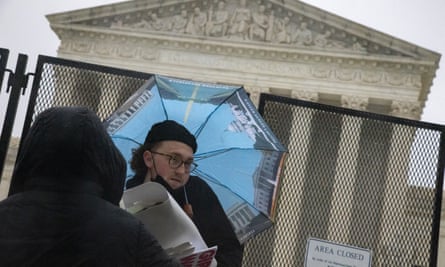A University College London scientist has accused lawyers in the US of misusing his groundbreaking work on the brain to justify the dismantling of Roe v Wade, the landmark ruling that legalised abortion nationally in America.
Giandomenico Iannetti said his research, which used imaging to understand the adult brain’s response to pain, had been wrongly interpreted to make an anti-abortion argument.
Last week an unprecedented leak of a draft legal opinion showed a majority of supreme court judges support overturning Roe v Wade and ending federal protections for abortions, in a move that could result in 26 states banning it. The court is considering a case, Dobbs v Jackson Women’s Health Organisation, which challenges Mississippi’s ban on abortion after 15 weeks gestation.
Anti-abortion lawyers in that case argued that scientific understanding has moved on since the court’s 1973 ruling that enshrined the constitutional right to abortion, and it was no longer accurate to say foetuses cannot feel pain before 24 weeks.
Their argument relied heavily on a controversial discussion paper on foetal pain published in the Journal of Medical Ethics in 2020 by Dr Stuart Derbyshire, a British associate professor of psychology at the National University of Singapore.
The paper claims that some of Iannetti’s research results suggest we might not need a cerebral cortex – which remains undeveloped in a foetus of less than 24 weeks – to feel pain.
Iannetti, an Italian professor of neuroscience who now leads a laboratory in Italy but spent the past 16 years researching at UCL and Oxford University, is adamant that this is “an unjustified leap”.
“My results by no means imply that the cortex isn’t necessary to feel pain. I feel they were misinterpreted and used in a very clever way to prove a point. It distresses me that my work was misinterpreted and became one of the pillar arguments they [the lawyers] made,” he said.
Prof Iannetti had no idea the paper was being used to justify the dismantling of Roe v Wade until American colleagues contacted him to say they were “shocked” at the way his findings were being presented. He helped academics in the US to draft a response for the lawyers but says he feels it is out of his control and “there isn’t much more I can do to stop people claiming my work says something it doesn’t”.

Leading pain scientists and academic medical societies on both sides of the Atlantic strongly dispute the anti-abortion legal argument, insisting the international scientific consensus that it is not possible for foetuses to experience pain in the first few weeks of existence remains firm and “irrefutable”.
John Wood, professor of molecular neurobiology at UCL, said: “I thought this opinion piece [by Derbyshire] was inaccurate.” Wood insisted that “all serious scientists” agreed a foetus cannot feel pain until 24 weeks, “and perhaps not even then”.
He said lawyers were right to say that science has moved on since 1973, but not in the way they were claiming. “For instance, we understand a great deal more about pain in newborn babies,” he said. “Interestingly surgeons who operate on foetuses say that there is movement on surgical intervention from week 36.”
Derbyshire told the Observer he is “firmly pro choice”. He insisted that he had not overstepped in his paper, and claimed that while Iannetti’s work had nothing “directly” to do with foetal pain it had “unsettled the consensus that the cortex is necessary for pain”.
He said: “I don’t honestly see how we can rule out the foetus having some raw experience that is akin to pain. It may be for ever unknowable, and it will not be an equivalent to what you or I experience, but that does not make it nothing.”
Prof Vania Apkarian, director of the Centre for Translational Pain Research at the Feinberg School of Medicine in Chicago, who has spent two decades studying pain in humans and animals, said the evidence on foetal pain had not changed since 1973 and remains “irrefutable”.
“There is no rational basis for arguing a foetus can suffer pain before 24 weeks. The anatomy of the brain is not formed enough for that to be possible,” he said. “The foetus is in an essentially sleep-like state in the womb.”
Apkarian wrote the scientific briefing for the Jackson Women’s Health Organisation case, on behalf of organisations including the Society for Maternal-Fetal Medicine in the US and the Royal College of Obstetricians and Gynaecologists in the UK. He spent months checking all the anti-abortion scientific references in case his side had missed some piece of serious evidence. “We hadn’t,” he said.
Apkarian believes science has been roped into a social and religious battle over abortion in order to play on people’s emotions. “The Mississippi case claimed that the foetus, when aborted, is suffering. They claimed that because it is such an emotionally highly laden statement. But it is also totally untrue,” he said.
Dr Meera Shah, chief medical officer of Planned Parenthood Hudson Peconic, in New York, said: “The bottom line is that a patient’s health, not unproven theories, should drive important medical decisions.”
